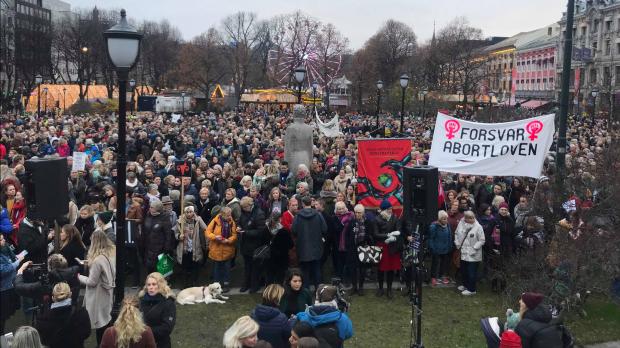Thousands of Norwegians took to the streets in the country on November 17, protesting the government’s proposals to restrict women’s access to abortion. Demonstrations took place in as many as 14 cities and 33 other sites, the action group Kvinnefronten was quoted as saying in the Independent.
Several banners and signs with the words “My body my right” and “Defend abortion” were held up by protesters in Oslo. Many also brought their children along. Brit-Agnes Svaeri, founder of Women’s March Norway, told The Independent, “Most people are shocked, men and women – there were a lot of men attending as well. As the signs said at the marches, I cant believe women’s bodies are on the negotiating table as part of a political power game again.”
She added, “We are supposed to be ahead of a lot of countries on these issues. Now, we might go backwards, which is really demotivating for countries who haven’t got there.”
The proposed amendment is the subject of talks between the ruling minority coalition led by the Conservative Party of prime minister Erna Solberg, and the small Christian Democrats Party (KrF). KrF currently has only eight MPs and supports the government from outside.
Prime Minister Solberg is trying to save her minority government by negotiating with KrF over the abortion law. She is seeking to stay on in power till the election scheduled for 2021.
The prime minister and KrF are seeking to bring changes to paragraph 2c, also known as Downs paragraph, a reference to Downs syndrome, a genetic disorder. The paragraph allows abortion even after the twelfth week of pregnancy if the child was to be born “seriously ill”. It also allows the abortion of a healthy twin if its sibling was to be ill. Opponents of this paragraph say that it can lead to classification in society.
.Prime minister echoed this view in a recent blog post. She said that developments in medical technology were leading to a “sorting” of human beings, adding that many members of her party were not comfortable with Norway being one of a few countries in northern Europe allowing the abortion of a healthy twin.
Norwegian laws allow for abortion on demand for the first 12 weeks. Abortion by application is permitted till the 18th week. After that, it is permitted only under special circumstances till the fetus is viable, which is presumed to be 21 weeks and 6 days.
The number of abortions has remained stable since the early 1970s, especially when adjusted for demographic changes related to fertility. Analysis by the Aftenposten newspaper found that only around 2% (287 abortions) were carried out after 12 weeks, the vast majority of them because of serious health conditions.
Norway’s limits for abortions are much shorter than in the UK. The latter allows terminations on requests for up to 24 weeks. Ireland, in the aftermath of a referendum in May, recently approved abortion. Abortion is legal in the European Union member states, including the Nordic states, except for Malta, where it is still forbidden.





